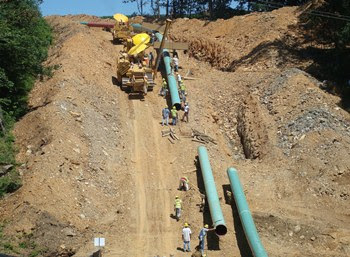Leaders from the Associated Petroleum Industries of Pennsylvania, the PA Independent Oil & Gas Association and PA Manufacturers Association Wednesday discussed the urgent need to expand the capacity of the Commonwealth’s pipeline system to allow producers to transport more natural gas and natural gas liquids to end-users.
“Additional pipeline infrastructure is the key to helping Pennsylvania fulfill the promise of its energy economy,” said API-PA Executive Director Stephanie Catarino Wissman. “Pipeline infrastructure doesn’t just help Pennsylvania natural gas get to market and help to lower energy costs for the residential and business community, it also benefits counties and townships thru the impact fee. If additional infrastructure is brought online, the drilling of new wells could increase and impact fee collections would rise accordingly, helping communities across Pennsylvania, according to a recent report by the PA Independent Fiscal Office.”
It is estimated that 25-30 percent of the wells drilled to date still do not have pipeline takeaway capacity to connect natural gas production to other markets across America.
Recent polling shows 82 percent of American voters support increased energy infrastructure, including strong majorities of Republicans (88 percent) Independents (88 percent) and Democrats (74 percent).
At least 14 major pipeline projects in the northeast United States are under review by the Federal Energy Regulatory Commission, all originating from the Marcellus and Utica shale plays.
These projects have the potential to supply huge amounts of affordable clean energy and natural gas liquids to support manufacturing as far away as Canada and the New England states to the north and North Carolina to the south.
“Pennsylvania’s manufacturers need new in-state infrastructure to deliver energy and natural-gas feedstocks outside the Marcellus Shale formation,” added PMA President David Taylor. “There is a new petrochemical manufacturing industry waiting to be born that will create even more wealth than the drilling has, but only if we build new pipelines to connect Pennsylvania natural gas production with the industrial consumers who are waiting for it.”
Natural gas and liquids interstate pipelines deliver 99.999 percent of product without incident.
Operators continue to spend billions of dollars every year to evaluate, inspect, and maintain pipelines, and API has released several new standards geared toward continuous pipeline safety improvement.
In addition to increasing safety, according delivering additional natural gas to market has additional environmental benefits.
According to the U.S. Department of Energy and the U.S. Energy Information Administration, our nation’s greenhouse gas emissions are at 20-year lows and this is a direct result of the use of natural gas produced by hydraulic fracturing.
“There are more than 60,000 miles of pipelines currently in operation in Pennsylvania, but those systems are at their capacity as a result of the huge increases in natural gas production in the Commonwealth over the past several years,” said PIOGA President & Executive Director Dan Weaver. “New pipelines are essential to safely transport this abundant energy to underserved markets in the United States, especially cities in the northeast corridor and New England where the demand for more affordable natural gas far exceeds the capacity of the present infrastructure.
Related Story:
DEP Presents Final Pipeline Infrastructure Task Force Report To Governor


No comments :
Post a Comment